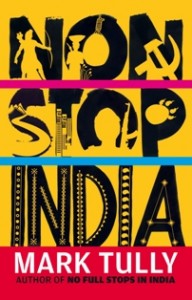10 essays in the book Non-Stop India by Mark Tully, take you through the issues that India faces. Issues that have probably existed all your life, you have heard or read about them sometime somewhere. And maybe a few of them have impacted you directly, but most belong to someone somewhere in the country. We know about the various angles of these stories, but maybe not all. Most of us probably know it at a level where we ridicule it by saying ‘Government does not do anything’, ‘Nothing can be done’. But we have never tried to explore the issue first hand and conclude what the problem is. Why it continues to be a problem even after decades. And after so many schemes and plans designed by both Government and Non-Government organizations. Despite a substantial amount of money being spent to address these issues.
Mark Tully, the quintessential BBC journalist, who knows India better than most Indians both because of his profession and because of his interest, has picked up 10 issues for this book Non-Stop India.
He and his partner Gillian traveled to various parts of the country. To talk to people whose issues they were exploring. They talked to all the other stakeholders of the issue, government officers, NGO workers, those who are reasons for the issue and those who are impacted. He then presents the issue from the point of views of all these people. Sometimes drawing instances from his previous visits for the same issue. He evaluates the impact of the programs to some extent. But most of the times he presents the facts as he saw them to you from all angles. And leaves the conclusion to you like a true journalist. Since he has met so many people, and I assume more than what he mentions in the book, it would have been good if he presented what he thought too.
In his first essay, he talks about Naxalites in Jharkhand. When you read about his travel in the heart of that movement, you really admire his courage and conviction for the story. He evaluates the impact of reservations on the caste system. And how some families have moved out of poverty and stigma of being backward class through reservations. He looks at the vote bank politics, construction of Ram Mandir at Ayodhya and nationwide projects such as project Tiger. He looks at the impact of building communities at village levels to ensure that the last mile corruption is taken care of and benefits reach everyone in the community rather than a few.
Then He looks at the impact of contract farming in Punjab. And evaluates if it really helps the farmers. And if it can be the testing ground for deciding if FDI in retail will, in fact, help the farmers get a better price for their produce. Like every story, there were farmers who were happy with the corporate buying and there were some who were not. Now we do not know the real percentage divide between the two to conclude either way.
He looks at the impact of English and how it has almost attained the status of a deity because the prospects it creates for the ones who can read and write it. It has emerged as the de-facto link language. At the same time, Hindi is also gaining acceptance in the areas where it was highly resisted earlier. And the credit goes to Hindi film industry. He also looks at people who are working hard to protect and preserve their language through initiatives like building dictionaries etc.

He chooses Tatas to look at the impact the government machinery has on businesses. The usual story on the Tatas was right out of the Tata PR material, often repeated and nothing new. The interesting part is author’s conversations with the few senior Tata officials who talk about the impact of liberalization on their businesses and their exponential growth post-1991. They talk about the problems that continue to exist. The time taking processes that are still one of the worst in the world but are much better compared to what they were twenty years back. This essay looks at the sudden surge of entrepreneurship in the country.
My favorite essay is that on Arunachal Pradesh. That tells a bit about the place – its people and its rituals. Though it intends to look at the development versus environment issue as the plan to make it a source of country’s hydroelectric power is being debated. I had recently taken a very similar journey to Arunachal. And I was amazed at how my feelings about the place matched Mark Tully’s. Though we traveled through different stretches of the state. Incidentally, both of us had the advantage of having a local person escort us through the journey. And tell us about their tribes and stories around them. I was as enchanted by the place as the author.
An overall theme that comes across the essays is the lack of governance. And the need for the government to put its act in place if India has to become a so-called superpower. An interesting multi-dimensional, first-hand look at the issues that we always knew from some angles, issues that continue to come in our way every now and then.
Read Non-Stop India it if you want to know the voices around these issues.









Cool blog!